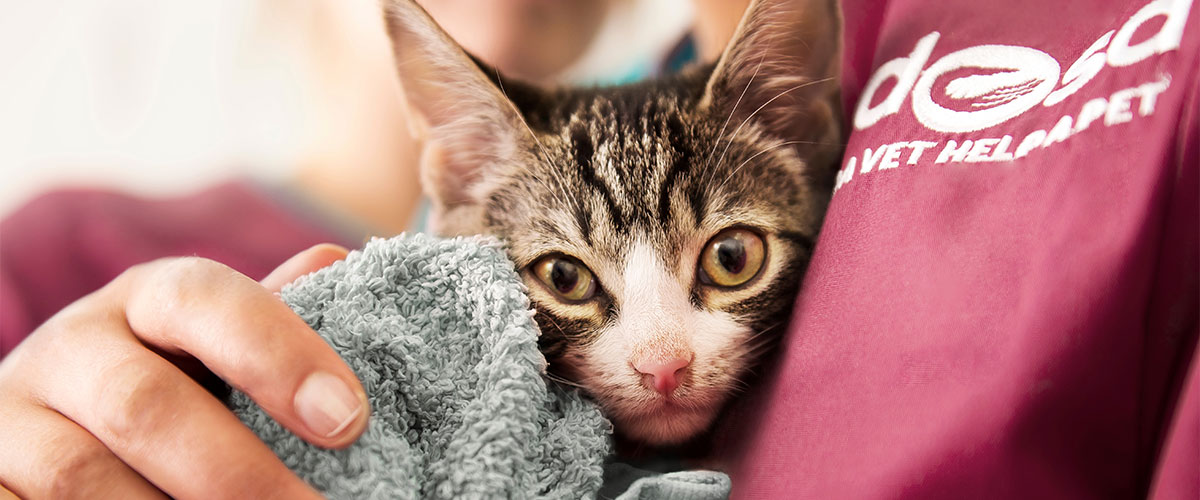Bowel Obstruction/Intestinal Blockage in cats
Overview
- Cats don’t often eat things they shouldn’t, but occasionally curiosity gets the better of them and can lead to a blockage.
- String, thread, hair bands, rubber bands and tinsel are the most common items to cause a gut blockage in cats. Vets call these unwanted objects ‘foreign bodies’.
- An intestinal blockage is a very serious condition that can kill.
- Vomiting and pain are often the first symptoms of a blockage.
- If your cat has a blockage, they may need an emergency operation.
- Contact your vet immediately if you think your cat has eaten something silly - never wait to see what happens.
General information and causes
PDSA vets treat over 2,700 pets a year that have eaten something they shouldn’t have! It’s much more common in dogs, but cats do occasionally swallow things such as: thread, tinsel, string, rubber bands, balls and even toys. Vets call these unwanted objects ‘foreign bodies’.
Swallowing an item that isn’t digestible can have disastrous consequences, especially if it blocks or damages the intestines. Left untreated, a blockage can lead to serious illness or even death.

PDSA vets treat thousands of pets who have eaten something they shouldn't have.
Symptoms
Common symptoms of a gut blockage include:
- Vomiting
- Pain (growling, hiding away or not wanting to be handled)
- Pooing less
- Low energy (lethargy)
- Little or no interest in food or drink
- Weight loss
- Other signs of feeling sick i.e. drooling, lip smacking and swallowing
- A string hanging from their mouth (never pull it).
When to contact your vet
Contact your vet immediately if your cat swallows something that could block them, or if they have any of the symptoms listed above. Never wait to see what happens – delaying treatment may cause your cat to become very ill or even die. You know your cat best. If they don’t have the exact symptoms listed above but you are still concerned, always contact your vet.
Treatment
Forced vomiting
Your vet may try to bring an item back up by giving your cat an injection to make them sick. However, this is only possible if you can reach your vet before the item moves through the stomach, and isn’t safe if it’s sharp or could get caught in the guts. Never try to make your cat sick at home.
Surgery
If your cat has something stuck in their intestines, they will need an emergency operation to remove it. If the item has caused damage, a length of their intestines may also need removing. This type of surgery is risky and can lead to complications. A potential complication is an infection inside the abdomen called ‘peritonitis’. Peritonitis is especially common after surgery or if the guts are torn by the blockage. Peritonitis can cause severe illness and be fatal without treatment.
Other medications
Your cat will need a variety of different medications, including pain relief, antibiotics and a fluid drip.
Homecare
Your vet will keep your cat in hospital until they are recovering and eating. Once they are home, you will need to nurse them back to full health by giving them all their prescribed medicines, several small meals throughout the day and a warm, comfortable, quiet place to rest. You may find our medication planner helpful. Your cat will need regular vet checks until they have fully recovered.
Outlook
Gut blockages can lead to severe illness and even death. Your cat’s outlook will depend on how serious their problem is. If they receive prompt veterinary care and don’t develop complications, they are likely to recover well. Sadly, sometimes even with prompt veterinary treatment, some cats don’t recover from a blockage.
Cost
Treatment for a gut blockage can become very expensive.
When you welcome a new cat into your life, consider taking out Cat Insurance straight away before any signs of illness start. This will give you peace of mind that you have some financial support if they ever get sick.
Find out whether you are eligible for free or low cost PDSA veterinary treatment using our eligibility checker.
Published: January 2020
Did you find this page useful?
Tell us more
Please note, our vets and nurses are unable to respond to questions via this form. If you are concerned about your pet’s health, please contact your vet directly.
Thank you for your feedback
Want to hear more about PDSA and get pet care tips from our vet experts?
Sign up to our e-newsletter
Written by vets and vet nurses. This advice is for UK pets only. Illustrations by Samantha Elmhurst.

